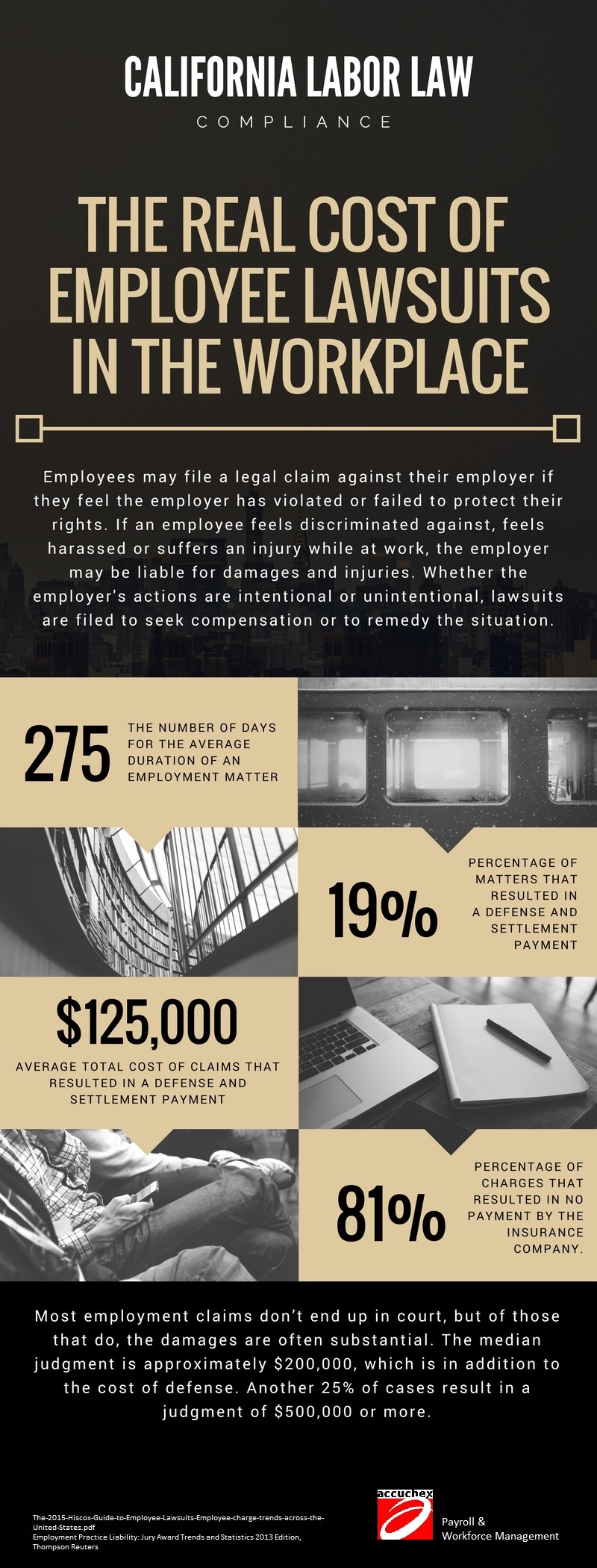In California, as in most states, employees may file legal claims against employers if they feel that their rights have been violated or were not protected. And it is a growing problem.

If an employee feels discriminated against, feels harassed or suffers an injury while at work, the employer may be liable for damages and injuries. Whether the employer's actions are intentional or unintentional, many workers file lawsuits seeking compensation or a remedy to the situation.
The California Workplace: Common Employee Lawsuits
Despite the best efforts and intentions of employers in California, avoiding employee lawsuits can be challenging. And while there are multitudes of employer violations that can be committed - knowingly and otherwise - there are a few common ones that make up the bulk of legal cases.
Here are the four most common employee claims made against employers nationwide, according to statistics from the U.S. Equal Employment Opportunity Commission (EEOC), a federal organization tasked with enforcing these laws:
Discrimination
One of the most common workplace lawsuits is discrimination. Discrimination in the workplace is a violation of several state and federal laws including the Civil Rights Act and the Americans With Disabilities Act (ADA). Discrimination involves unfair treatment because of a distinguishing characteristic such as gender, race, religious background or disability.
An employee who is a member of a protected class can file suit against an employer if he or she has been treated unfairly. The EEOC receives and investigates discrimination cases and provides workers with the resources to file a discrimination lawsuit against an employer.
Harassment
Typically, the second most common claim is by victims of harassment in the workplace. Harassment is not limited to just employers, but may come from a manager or supervisor, a co-worker, contract employee or a client or customer. Harassment is often, though not always, of a sexual nature. This included such acts as inappropriate comments or touching, but the harassment may also involve workplace violence or bullying.
Employees will often file a lawsuit if the employer was aware of the harassment but failed to remedy the situation.
Workplace Injury
Many employers are hit with lawsuits arising from workplace injuries. Work-related injuries are very common. According to the Bureau of Labor Statistics (BLS), in 2012 there were 2,976,400 recorded instances of workplace injury. This is one of the reasons employers purchase liability and worker's compensation insurance, in order to pay the expenses of an employee injured on the job.
When employers do get sued it is usually because they challenge a worker's compensation claim, or because their negligence or intentional action led to the worker's injury.
Wrongful Termination
Another common reason for workplace lawsuits is the wrongful termination of an employee. Wrongful termination occurs when a worker is fired or laid off unlawfully. For example, if an employer fires a worker out of retaliation because the worker filed a complaint. If a supervisor or manager fires an employee becuase the employee refused to violate the law, this, too, is considered wrongful termination.
Victims who file suit for wrongful termination may collect compensation including lost wages and possibly additional punitive damages if the situation is deemed severe.

Share this Image On Your Site
There are some steps employers can take to treat their employees fairly and mitigate the risk of these lawsuits. These include:
- Implementing systems and procedures for accurately tracking employees’ time
- Developing, distributing, and reviewing and regularly updating an employee handbook
- Keeping detailed records of employee performance, disciplinary actions, and company communications
Although these actions cannot guarantee that employees won’t suffer illegal or unfair treatment, or that an employer won’t be sued, they can go a long way to prevent such problems.
Complying With Labor Law - California and Federal
Another key step in maintaining HR compliance and increasing your company's cost-effectiveness is to consider outsourcing. A professional payroll management and workforce solutions provider such as Accuchex can offer much-needed help with Human Resources needs and questions.
If your organization would like to learn more about its obligations, or acquire resources to deal with these types of situations, Accuchex recently partnered with HR Solutions Partners to offer its customers the most up-to-date and professional human resources management solutions available. To learn more about the different levels of Human Resource Management services available, please follow this link.
To learn more about the services Accuchex provides, click on the button below to download our free guidebook:



